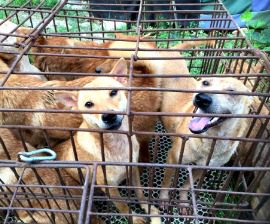Humane Society International welcomes checkpoints set up on Yulin roads to stop illegal dog trucks, urgent festival closure still needed.
With just one day to go until China’s Yulin dog meat festival, Humane Society International has rescued 20 sick and injured dogs from a slaughterhouse on the outskirts of Yulin. The dogs are being transported to a shelter for veterinary treatment for eye infections, skin disease and lacerations. Last week, HSI rescued another 34 dogs and cats from a different Yulin slaughterhouse.
Adam Parascandola, HSI’s director of animal protection and crisis response, said from the rescue scene: “In the early hours of the morning, we went to the live dog market that sits outside a slaughterhouse. It was heartbreaking to see the dogs crammed into tiny cages and panting in the heat. One lone mangy dog in a cage by himself gave a small tail wag when I spoke to him. It’s amazing that he was still so trusting after so much suffering. Luckily we were able to rescue him and 19 other dogs. We gave them water, which most lapped frantically, and their tails wagged as we talked to them. I’m so relieved we were able to get these dogs out, and that soon they will know the love and comfort all animals should enjoy.”
HSI’s team in Yulin reports that the atmosphere in the city is tense, but so far evidence suggests reduced killing and less visible dog meat eating than in previous years. And today, the Yulin authorities set up road checkpoints to stop incoming trucks filled with dogs and cats, a key proposal that HSI and its partners in China have lobbied for. As many animals will have already been brought to Yulin, however, HSI urges the government to take more decisive steps such as shutting down the slaughterhouses.
Peter Li, China policy specialist for HSI, said from Yulin: “Yulin feels like a place that’s holding its breath right now. Business was slow at the Dongkou animal market, and a dreadful slaughterhouse exposed by Humane Society International a couple of months ago was shut down when we returned yesterday. Another slaughterhouse we visited was open but we saw no live animals. The word ‘dog’ has been painted out or covered with tape on several of the restaurants and slaughterhouses we saw, and a Yulin official told us that, contrary to what has been reported in some media, dog meat sales have in fact been declining continuously.
“We’re still seeing market stalls and mopeds piled with the typical brown blowtorched bodies of dogs, but as yet nothing like the scale we feared. It’s a muted Yulin for sure. The authorities seem nervous and are warning dog and cat traders not to engage with us and alerting government employees to stay away from the dog meat restaurants.”
Under China’s “one certificate per dog” rules, all trucks shipping live dogs and cats across provincial boundaries are supposed to have an individual health certificate for each animal. Advocates with China Animal Protection Power, a coalition sponsored by HSI that since 2014 has rescued tens of thousands of dogs from these trucks, report that most truckers fail to conform to this national policy and have either no certificates or have produced fraudulent documents. They find the majority of dogs and cats are stolen pets or strays.
- A new poll conducted by Chinese polling company Horizon, and commissioned by Chinese group China Animal Welfare Association in collaboration with HSI and Avaaz, found that most Chinese citizens want the Yulin festival to end, saying it blackens China’s image.
- 64 percent support the end of the Yulin festival
- 51.7 percent say the dog meat trade should be completely banned
- 62 percent think Yulin damages China’s reputation
- 69.5 percent have never eaten dog meat
- It’s not a traditional festival, it was only invented in 2010 by dog traders to boost profits.
- Before the festival started, Yulin had no history of mass dog slaughter and consumption.
- An estimated 30 million dogs a year are killed across Asia for their meat, some 10-20 million in China alone, and thousands die just for Yulin.
- The World Health Organisation warns that the dog trade spreads rabies and increases the risk of cholera 20-fold.
- Humane Society International, Beijing Mothers Against Cruelty and VShine submitted a petition in Beijing signed by more than 11 million people around the world.

| [donate]
| Help keep news FREE for our readersSupporting your local community newspaper/online news outlet is crucial now more than ever. If you believe in independent journalism,then consider making a valuable contribution by making a one-time or monthly donation. We operate in rural areas where providing unbiased news can be challenging. |



















